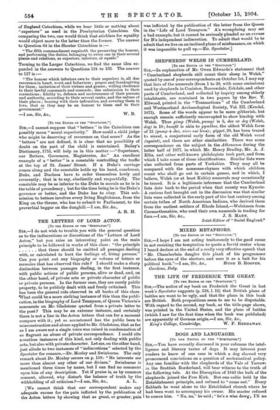THE LETTERS OF LORD ACTON.
[To THE EDITOR OF THE "SPECTATOR."]
Sur,—I do not wish to trouble you with the general question as to the indiscretions or discretions of the "Letters of Lord Acton," but you raise an interesting point on the main principle to be followed in works of this class : "the principle that there should be omitted all passages dealing with, or calculated to hurt the feelings of, living persons." Can you point out any biography or volume of letters or memoirs that has observed this rule ? I should make a sharp distinction between passages dealing, in the first instance, with public actions of public persons, alive or dead, and, on the other hand, of private acts or private character of public or private persons. In the former case, they are surely public property, to be publicly dealt with and freely criticised. This has been the general rule observed in all books of this class. 'What could be a more striking instance of this than the publi- cation, in the biography of Lord Tennyson, of Queen Victoria's comments on Mr. Gladstone quoted from a private letter to the poet ? This may be an extreme instance, and certainly there is not a line in the Acton letters that can for a moment compare with it ; yet so accustomed has the public been to misconstruction and abuse applied to Mr. Gladstone, that as far
• as I am aware not a single voice was raised in condemnation of so flagrant an abuse of private correspondence. I could cite countless instances of this kind, not only dealing with public acts, but also with private character. Let me, on the other hand, just allude to two instances of " indiscretions " selected by the Spectator for censure,—Dr. Mozley and Swinburne. The only remark about Dr. Mozley occurs on p. 158: "He interests me more than almost any other of our divines." Swinburne is mentioned three times by name, but I can find no comment upon him of any description. Yet if praise is, as by common consent, allowed, why disturb the balance of truth by the [We cannot think that our correspondent makes any adequate excuse for the pain inflicted by the publication of the Acton letters by showing that as great, or greater, pain was inflicted by the publication of the letter from the Queen in the "Life of Lord Tennyson." A's wrongdoing may set a bad example, but it cannot be seriously pleaded as an excuse for B's independent indiscretion. To admit that would be to admit that we live on an inclined plane of misfeasance, on which it was impossible to pull up.—En. Spectator.]










































 Previous page
Previous page